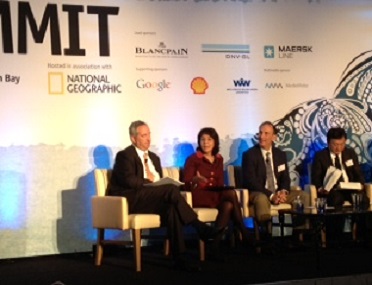Remarks at the World Ocean Summit panel: “The Ocean as the New Economic Frontier”

Read Commissioner Damanaki's remarks during the World Ocean Summit in San Francisco. Commissioner participated in a panel discussion entitled "The Ocean as the New Economic Frontier".

Remarks by Maria Damanaki at Plenary Panel “The Ocean as the New Economic Frontier” of the World Ocean Summit 2014 organised in San Francisco, USA.
Thank you Daniel. Let me first of all congratulate you: the theme of this panel is spot on. It very much touches upon my ambition, as European Commissioner, to create a secure investment climate for our economy; and at the same time protect the vital resource that is the sea.
As we struggle out of the recession and as we run out of resources on land, it is only natural that we should turn to the oceans.
Cultivation at sea does not require land or freshwater. Harnessing the wind and waves does not produce greenhouse gases. And soon the huge diversity of marine genetic material sea life will be able to deliver food and medicines for us.
There are opportunities for jobs here. I’ve been saying for years now that from the beauty of shores to the power of winds and tides, we have a formidable economic engine in the seas and oceans.
This is backed by extensive research in the EU And because we strongly believe in the gravitational pull of our coastal and maritime regions for the economy, we have devised our 'blue growth' strategy - a policy that makes so much sense, that it has been immediately picked up by all European Ministers; and that has been assigned a significant share of our research funds.
So, how do we foster 'Blue growth'?
We look at specific areas where we think there are opportunities to seize, such as: ocean energy, aquaculture, tourism, blue biotechnology, deep-sea mining. And we move to provide the best possible operational conditions for businesses.
Take ocean energy, for instance. Recent research suggests that wave energy alone could theoretically cover three-quarters of the total energy consumption of the European Union in 2030. And it is a source that never runs out. Just think of the transformative impact this could have on our society. But of course it is a train that we need to start catching today.
So I've been saying that, at a time when most nations go through difficult economic times, we do in fact have a huge potential locked in the seas and oceans.
But I’ve also been saying that if the sea is worth the investment, it is not growth at all costs that we should seek. We don’t want a random, frenzied “gold rush” that will inevitably leave us with problems as big as the ones we have on land.
Growth can turn against us. Since the industrial revolution it has been faster than the growth in our population and we may have kept the reins loose on it - but this is changing now.
And now we need a different kind of growth.
We need to find the fine line where economic sustainability and environmental sustainability meet, and keep that balance over time.
Offshore wind is a good example. Of course it costs a bit more to construct turbines at sea rather than on land. But, as all sailors know, the wind is stronger offshore; and it is a fundamental law of economics that, as you increase production, the costs come down.
In Europe we are going for it. Installed capacity is growing at 40% a year – and creating new jobs in construction, maintenance and design of the next generation.
And success breeds success. We are now building up the infrastructure for this new economy - shipyards to build the offshore structures, but also the vessels to supply and maintain them… underwater cables to deliver the power to consumers… and this in turn is generating jobs.
We all know the challenge here: on one hand we need to facilitate growth for all maritime sectors, existing and emerging. On the other hand we need keep that growth sustainable.
In my view there is only one way to go about it for us policy makers: we need to create the best operational conditions for business to make the leap towards sustainability.
This does not mean adding layers upon layers of red tape: we should certainly not over-regulate, but we do need to regulate just enough to create a transparent, consistent, level playing field that rules out unsustainable choices for good and that enables the private sector to find and apply innovative, smart solutions.
Let's see another case. Local communities do not always welcome seeing aquaculture cages close to their shores. Moving them further offshore benefits from higher quality water and allows them to be washed by the ocean currents. We have the technology.
I say let us make it possible for business to go for it: let us help them access finance and skilled labour. And let us help them choose the right spot. Locating one farm across state borders can be more efficient and environmentally sounder than building two in two separate and more vulnerable spots.
Just like reallocating shipping lanes away from protected areas reduces the risk of environmental disasters. And so on.
In the EU we have created a framework for maritime and coastal Spatial Planning for our States to plan their use of space and even multiple uses of the same space. This gives environmental legitimacy to public planning and legal certainty to private investors.
Just as we want to plan the use of space as carefully as we do on land, it is probably not a bad idea to control sea traffic as strictly as we control sky traffic.
We are now actively preparing the ground for a totally integrated maritime security strategy, which we believe will tremendously improve our rescue operations and our fight against crime and pollution through cooperation between surveillance authorities in a cost-efficient way.
I don’t see why such an idea should not move to the global level one day. In fact the sooner, the better.
Because space planning and surveillance concur to help the other crucial aspect of sustainability: safety.
It may not be possible to rule out risks entirely when working offshore. But we must take concrete action to prevent accidents like the 2010 Deepwater Horizon; and also smaller accidents like blowouts, explosions, structural failures and the like.
We must make sure that, as new shipping lanes open up in the Arctic because of the receding ice, we don’t just take the good. But we also properly prepare for all the risks involved.
Otherwise, whatever economic miracle we build, it’ll be built on sand.
There are many other things we can do to make sure that the new economic frontier is tread upon safely and sustainably: for Europe we have provided guidance in support of aquaculture, ocean energy and tourism; and we are now looking at what can be done in marine biotechnology and deep-sea mining.
We believe these are extremely promising sectors that need an extra push from the authorities to produce the socio-economic mutation that we need.
And because a lack of access to marine data has been holding us back, we have committed to better understanding it through research, both at EU level and through cooperation over the Atlantic.
Reducing the level of uncertainty to the sea's behavior should defeat, as we have invariably seen across Europe and across sectors, the operators' inherent reluctance to invest.
Basically what I'm saying is that we are developing cross-cutting tools and sea-basin strategies, because the sea is a complex 'system' requiring a rational, systematic, holistic approach.
This is why international cooperation is so important and this is why I would like to see some of those tools make the leap: from European to global.
Don’t get me wrong. We do have instruments at global level – instruments, like UNCLOS, that are valuable and necessary. But they can be slow, fragmented and easily hampered by a few.
They are certainly not fit for the economic challenges of this century nor are they able apt to respond in real time to the changing circumstances of the dynamic marine environment.
The ocean challenge demands that we streamline them, upgrade them and in parallel we create common tools, apply common strategies, pool our means and fill in the gaps.
In conclusion, I say yes to the new economic frontier, but resolutely no to a "lawless Wild West". Let us not forget that developments today, good or bad, go at very high speed. The promise of new riches from the sea should not blind us to the dangers and consequences for future generations.


